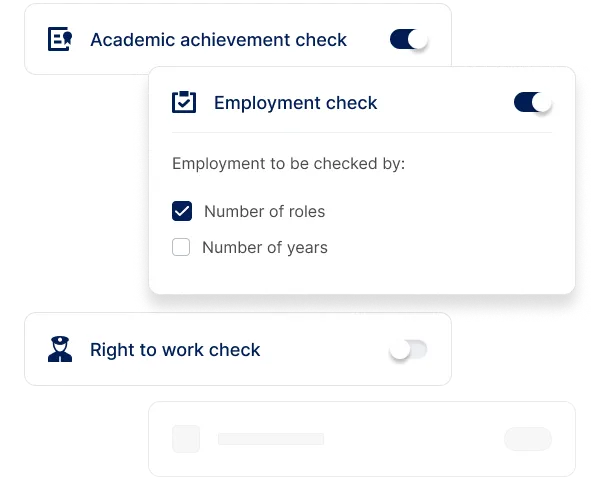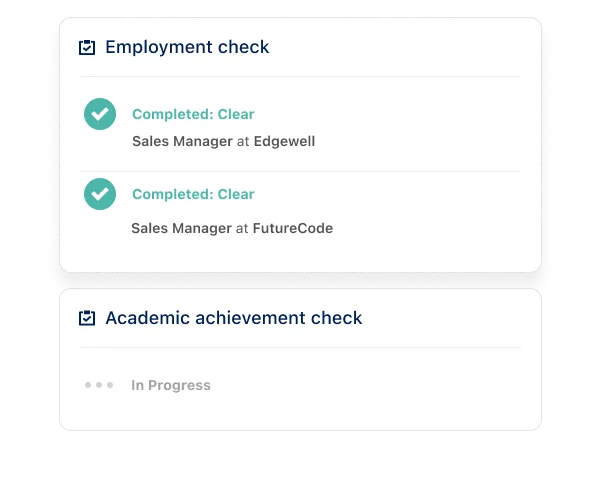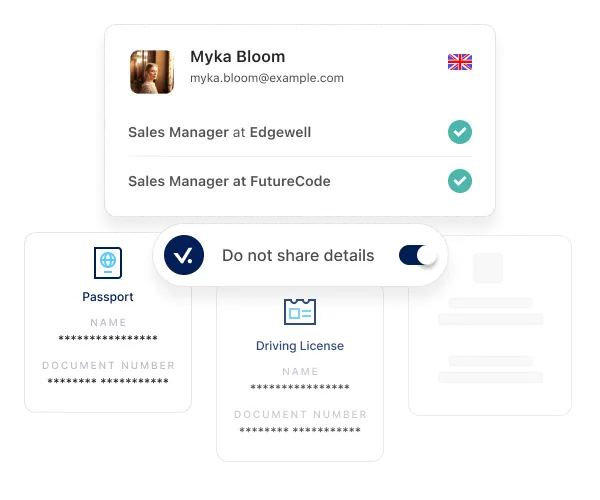Comprehensive Guide to Employment Background Checks in France
Everyday, Veremark carries out background screening all over the world for companies who need checked and verified employees. If you’re looking for background checks in France, here’s some information that might help.
As one of Europe’s largest economies, France boasts a diverse and skilled workforce, essential for its growing industries such as technology, finance, and healthcare. To attract top talent and mitigate risks, employers are increasingly utilising employment background checks. This guide provides a comprehensive overview of employment background checks in France, including the legal framework, common checks conducted, privacy considerations, and best practices for employers.
Introduction to France's Growing Economy and Workforce
France is a leading economic power in Europe, characterised by its robust service sector, which includes finance, tourism, and technology. The country has witnessed a steady recovery following recent economic challenges, with innovations in tech and renewable energy driving growth. This expanding economy demands a skilled workforce, making it crucial for employers to conduct thorough background checks to ensure they hire qualified and trustworthy candidates.
With rising competition for talent, employers must take proactive measures to verify candidates’ qualifications and backgrounds. Background checks not only safeguard businesses but also foster a culture of trust and integrity within the workplace.
Legal Framework and Data Protection
France has a well-defined legal framework governing employment background checks, largely influenced by national laws and European Union regulations, particularly the General Data Protection Regulation (GDPR). Employers must navigate these regulations carefully to ensure compliance and protect candidates' rights.
Key Legal Aspects of Background Checks in France:
- Regulated but permissible: Background checks in France are legal but must be relevant to the job role. Employers cannot conduct invasive checks that do not pertain to the responsibilities of the position.
- Explicit consent required: Candidates must provide explicit written consent before any background check can be initiated. This requirement ensures transparency and respect for the individual’s privacy.
- Job relevance: Employers should only conduct checks that are pertinent to the job being applied for. For example, criminal checks are typically reserved for roles involving significant responsibility, such as positions in finance or education.
- GDPR compliance: As a member of the EU, France strictly adheres to GDPR. This requires employers to manage personal data carefully, ensuring candidates are informed about how their data will be used and retained.
Common Background Checks in France
In France, various types of background checks are commonly conducted to assess candidates’ suitability for employment. The most prevalent checks include:
Criminal record checks are often required for positions where trust and safety are critical, such as in finance, education, or healthcare. Employers must obtain the candidate’s consent before performing these checks and ensure that they comply with legal standards.

Employers routinely verify candidates’ employment histories to confirm previous job titles, responsibilities, and lengths of service. This process is crucial in validating the candidate’s claims and ensuring they have the necessary experience for the role.

Education checks are essential for verifying academic qualifications. Employers confirm degrees, certifications, and the institutions attended, particularly for positions that require specific educational backgrounds, such as healthcare and teaching roles.

Global watchlist checks involve screening candidates against international sanctions lists, criminal databases, and regulatory watchlists. These checks are particularly relevant for companies in finance and international trade, helping to ensure compliance with global regulations.


Seamless integration with existing hiring software
Plug our award-winning background screening software into your existing hiring workflows with Veremark's super-fast RESTful API.
Privacy and Data Security
Given the sensitive nature of background checks, privacy and data security are paramount in France. Employers must adhere to strict guidelines to protect candidates’ personal information.
Key Considerations for Privacy and Data Security:
- Informed consent: Employers must obtain explicit consent from candidates before collecting any personal data related to background checks. Candidates should be made aware of what data is being collected and for what purpose.
- Data minimisation: Employers should collect only the minimum necessary personal data required to complete the background check. This approach aligns with GDPR principles and reduces the risk of handling excessive data.
- Secure data storage: Personal data collected during background checks must be stored securely, accessible only to authorised personnel. This safeguards candidates’ privacy and minimises the risk of data breaches.
- Data retention and deletion: Employers must have clear policies on how long candidate data will be retained. Under GDPR, personal data should only be kept as long as necessary for its intended purpose and securely deleted thereafter.
Turnaround times
Industries Benefiting from Background Checks
Finance
The finance sector requires thorough background checks to ensure compliance with regulatory frameworks and to prevent financial crimes. Criminal record checks and global watchlist screenings are particularly important.
Healthcare
Background checks in healthcare are essential for verifying staff qualifications and criminal histories, especially for roles involving direct patient care.
Education
Employers in the education sector are mandated to conduct criminal background checks on individuals working with children or vulnerable populations, ensuring student safety.
Technology and Cybersecurity
In sectors that handle sensitive information, such as IT and cybersecurity, background checks help ensure employees possess the integrity and skills necessary to protect data.
Best Practices for Employers Conducting Background Checks in France
To ensure compliance and efficiency, employers in France should follow these best practices when conducting background checks:
- Obtain explicit written consent: Always secure informed consent from candidates before conducting background checks, ensuring transparency and compliance with legal standards.
- Conduct relevant checks: Perform only those background checks that are necessary for the specific role, avoiding unnecessary invasiveness.
- Engage reputable providers: Work with trusted, compliant third-party background check providers familiar with French regulations to ensure accurate and efficient checks.
- Ensure GDPR compliance: Follow GDPR guidelines throughout the background check process, including obtaining consent, data minimisation, secure storage, and timely deletion of data.
- Plan for turnaround times: Factor in the time required for background checks when establishing recruitment timelines to avoid delays in the hiring process.
How it works




Data protection by design
Vault-like security with ISO and SOC2 certification
As France continues to strengthen its position as a competitive player in the global economy, employment background checks are becoming an essential part of the hiring process for businesses. By adhering to legal standards, focusing on relevant checks, and implementing best practices for data protection, employers can safeguard their organisations and build a trustworthy workforce.
When conducted thoughtfully and in compliance with French and European regulations, background checks provide employers with the confidence needed to make informed hiring decisions, ultimately contributing to a secure and effective workplace.
Read more
FAQs
This depends on the industry and type of role you are recruiting for. To determine whether you need reference checks, identity checks, bankruptcy checks, civil background checks, credit checks for employment or any of the other background checks we offer, chat to our team of dedicated account managers.
Many industries have compliance-related employment check requirements. And even if your industry doesn’t, remember that your staff have access to assets and data that must be protected. When you employ a new staff member you need to be certain that they have the best interests of your business at heart. Carrying out comprehensive background checking helps mitigate risk and ensures a safer hiring decision.
Again, this depends on the type of checks you need. Simple identity checks can be carried out in as little as a few hours but a worldwide criminal background check for instance might take several weeks. A simple pre-employment check package takes around a week. Our account managers are specialists and can provide detailed information into which checks you need and how long they will take.
All Veremark checks are carried out online and digitally. This eliminates the need to collect, store and manage paper documents and information making the process faster, more efficient and ensures complete safety of candidate data and documents.
In a competitive marketplace, making the right hiring decisions is key to the success of your company. Employment background checks enables you to understand more about your candidates before making crucial decisions which can have either beneficial or catastrophic effects on your business.
Background checks not only provide useful insights into a candidate’s work history, skills and education, but they can also offer richer detail into someone’s personality and character traits. This gives you a huge advantage when considering who to hire. Background checking also ensures that candidates are legally allowed to carry out certain roles, failed criminal and credit checks could prevent them from working with vulnerable people or in a financial function.
Transform your hiring process
Request a discovery session with one of our background screening experts today.



%20(1)%20(2)%20(2)%20(1).jpg)
%20(1).webp)
